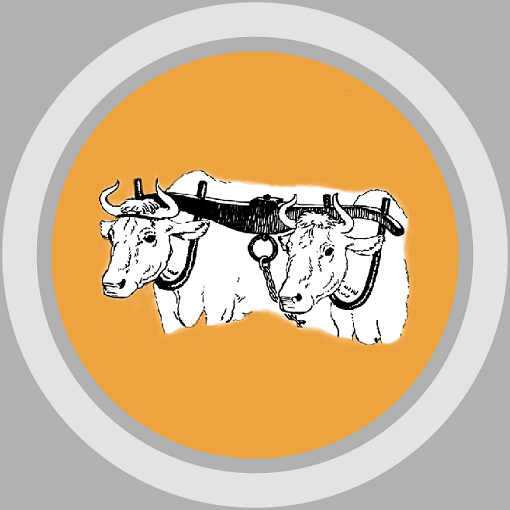YOKE

English word "join" is related to "yoke" because both of those words come from the same root. They are also connected to a process or an idea of joining two animals together with a piece of wood and then using them for ploughing.
What is even more interesting is that the word "Yoga" also comes from this idea.
IUK- IUG-
Hittite: iukan, iūk-, (GIŠ)iuka-
Old Saxon: juk
Gothic: 𐌾𐌿𐌺 (juk), 𐌾𐌿𐌺𐌿𐌶𐌹 (jukuzi)
Saterland Frisian: Juk
West Frisian: jûk
Middle Low German: juk
Middle Dutch: juc
Dutch: juk
Kurdish: cûk (ǰūk)
Bulgarian: югавица (jugavica)
Latvian: jugs
Latvian: jugt ("to join together")
Manichaean: ywg (juğ)
Middle Persian: ywg (juğ)
Latin: iugum
Bengali: যুগ (jug)
Persian: یوغ (yuğ)
Hindi: युग (yug)
Marathi: युग (yug)
Sanskrit: युग (yugá)
Spanish: yugo
Telugu: yugamu
English: jugular
Old French: jug
Portuguese: jugo
Romanian: jug
Kashubian: jugò
Gaulish: ver-iugus
Slovincian: jugo
LUC-
Old Armenian: լուծ (luc)
Armenian: լուծ (luc)
-UK- -UG-
Old Swedish: uk
Gutnish: uk
Elfdalian: uok
Ancient Greek: δυγός (dugós)
Ancient Greek: ζυγόν (zugón)
Ancient Greek: ζεύγνυμι (zeúgnumi)
- to yoke, saddle, bridle a beast of burden = horses, cattle, mules
- to get a chariot ready
- to have one's beasts yoked
- to fasten tightly
- to join in wedlock
- to build a bridge from bank to bank
- to furnish ships with crossbenches
- to pair gladiators
Ancient Greek: ζυγός (zugós)
Greek: ζυγός (zygós)
Assamese: যোগ (züg) ("meditation, yoga")
ZU-
Konkani: जु (zu)
French: joug (ju, žu)
Pashto: جوغ (źuǧ)
JU-
Avestan: yuua (found only in compounds)
Younger Avestan: yujiieiti ("to yoke, harness")
Kalasha: ǰu
Torwali: يو (yū)
Maharastri Prakrit: jua
Marathi: जुंव (juuv), जुवाली (juvālī)
Hindi: जूआ (jūā)
Nepali: जुवा (juwā)
Urdu: جوا (jūā)
Aromanian: giug
Romansh: giuf
Sicilian: giugu, jugu, juvu
Sardinian: giú, giubu, giuu, giuvu, yuu
IUH-
Czech: juhana
Old High German: jūh
Middle High German: jiuch
IUNG-
Lithuanian: jungas
Lithuanian: jungti ("to join together")
Latin: iungo ("I join")
Portuguese: junguir, jungir, juntar ("to join")
Sanskrit: युनक्ति (yunakti), युन्जन्ति (yunjanti) ("to yoke, harness, join")
-UN- -UM-
Italian: giungere, giuntare ("to join")
Spanish: juntar, uncir, juncer, junger ("to join")
Sicilian: jùnciri ("to join")
Catalan: junyir, júnyer ("to join")
Pali: yuñjati ("to yoke, harness")
Asturian: xuncir, xuntar ("to join")
Maharastri Prakrit: juṃjaï ("to yoke, harness")
Marathi: जुंपणे (jumpṇe) ("to yoke, make work")
Galician: xunguir, xuntar ("to join")
-ING-
Old Irish: cuing
Irish: cuing
Manx: quing
Scottish Gaelic: cuing ("yoke, bond, obligation, restraint, hinderance, stoppage, captivity, strait, difficulty")
IG- IK-
---> Estonian: ike
Old Church Slavonic: иго ⰹⰳⱁ (igo)
Macedonian: иго (igo)
Serbo-Croatian: и́го, igo, jìgo, Ig
Old East Slavic: иго (igo)
Russian: и́го (igo)
Bulgarian: и́го (igo), иг (ig)
Polish: igo, Igołomia
Slovene: igọ̑, jigo, jəhû, igev
Kashubian: jigò, jigoe, jigø
Slovincian: vjīgɵ, i̯igᵘó
IH-
Belarusian: і́га (iha)
Ukrainian: і́го (iho), и́́го (ý́ho)
Czech: jho
Old Slovak: jho
Slovak: jho
IOK- IOG-
---> Chinese: 瑜伽 (MC jɨo ɡɨɑ) ("physical, mental, and spiritual practice or discipline")
Old English: ioc, ġioc, ġeoc
Middle English: ȝok, yok
Scots: ȝok, ȝoke, ȝock, ȝocke, yok, yoke
English: yoke
West Frisian: jok
Middle Dutch: joc
Middle Low German: jok
Low German: Jok, Jog
Persian: جغ (joğ)
Sanskrit: योग (yóga, yauga)
- the act of yoking, joining, attaching, harnessing, putting to (of horses)
- any junction, union, combination, contact with
- mixing of various materials, mixture
- connection, relation
- application or concentration of the thoughts, abstract contemplation, meditation
- the union of soul with matter
- the connection of a word with its root, original or etymological meaning
- equipping or arraying
Pali: yoga ("meditation, yoga")
Bengali: যোগ (jog) ("meditation, yoga")
Gujarati: યોગ (yog) ("meditation, yoga")
Hindi: योग (yog) ("meditation, yoga")
Konkani: योग (yog) ("meditation, yoga")
Marathi: योग (yog) ("meditation, yoga")
Tamil: யோகா (yōkā) ("meditation, yoga")
Telugu: yōgā ("meditation, yoga")
Punjabi: ਯੋਗ (yog) ("meditation, yoga")
OK- OG-
Old Norse: ok
Icelandic: ok
Faroese: ok
Norwegian: åk
Old Swedish: ok
Swedish: ok
Danish: åg
Norwegian Nynorsk: øyk ("draft animal")
Norwegian Bokmål: øyk, øk ("draft animal")
Helsingian: ök ("draft animal")
Old Swedish: øker, øk ("draft animal")
Swedish: ök ("draft animal")
Old Danish: øk, øgh ("draft animal")
Scanian: ǿg ("draft animal")
Danish: øg ("draft animal")
IOH-
Old High German: joh
Middle High German: joch
German: Joch
Plautdietsch: Joch
IAH-
Luxembourgish: Jach
IEU- IEV-
Middle Breton: yeu
Cornish: yew
Breton: yev
IES-
---> Finnish: ies
---> Ingrian: iez
IEG-
Polabian: jeiǧǘ, jeigü
IEO-
Middle Breton: ieo
JO-
Italian: giogo (dʒoɡo, džiogo)
Occitan: jo
Friulian: jôf, jôv
Catalan: jou
English: join
French: joindre, jointer ("to join")
Ladin: jonjer ("to join")
Occitan: jónher ("to join")
Old Welsh: iou
Bengali: জোয়াল (joyal)
-ON-
Friulian: zontâ ("to join")
Venetian: xónxer, xontar (zonzer, zontar) ("to join")
Galician: xoncer ("to join")
OtHer
Welsh: iau
Pashto: جغ (źëǧ, juǧ), ځغ (źeǧ), زغ (zëǧ)
Dalmatian: zaug
Aragonese: chubo
Galician: xugo
Asturian: xugu
Walloon: djeu
Venetian: dóvo, dógo, xóo, dóo
Old Norse: eykr ("draft animal")
Westrobothnian: auk ("draft animal")
Article created on the 7th of November 2018.
